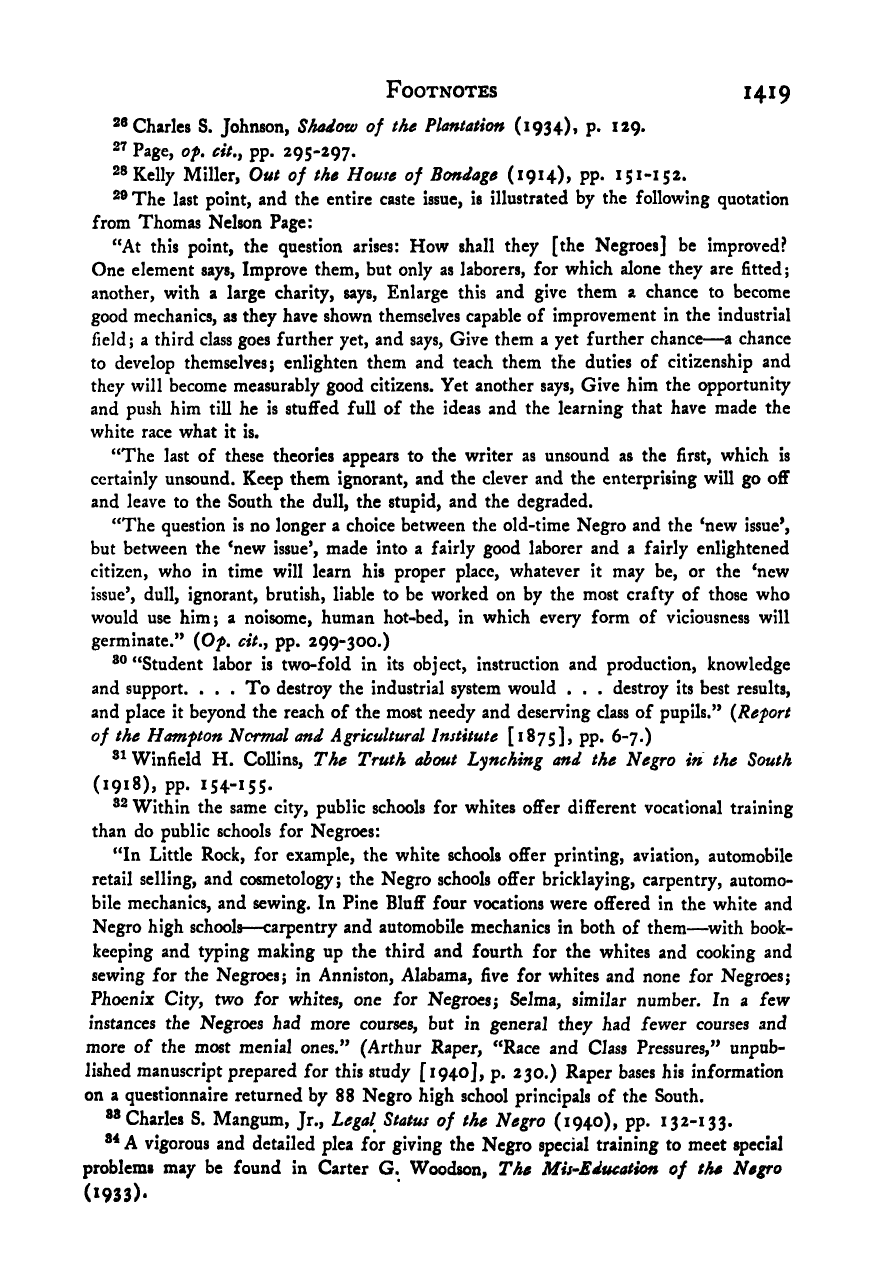Note: Gunnar Myrdal died in 1987, less than 70 years ago. Therefore, this work is protected by copyright, restricting your legal rights to reproduce it. However, you are welcome to view it on screen, as you do now. Read more about copyright.
Full resolution (TIFF) - On this page / på denna sida - Footnotes - Chapter 41

<< prev. page << föreg. sida << >> nästa sida >> next page >>
Below is the raw OCR text
from the above scanned image.
Do you see an error? Proofread the page now!
Här nedan syns maskintolkade texten från faksimilbilden ovan.
Ser du något fel? Korrekturläs sidan nu!
This page has never been proofread. / Denna sida har aldrig korrekturlästs.
Footnotes 1419
Charles S. Johnson, Shadow of the Plantation (1934), p. 129.
Page, of, cit,^ pp. 295-297.
Kelly Miller, Out of the House of Bondage (1914), pp. 1 51-152.
^®The last point, and the entire caste issue, is illustrated by the following quotation
from Thomas Nelson Page:
“At this point, the question arises: How shall they [the Negroes] be improved?
One element says. Improve them, but only as laborers, for which alone they are fitted;
another, with a large charity, says, Enlarge this and give them a chance to become
good mechanics, as they have shown themselves capable of improvement in the industrial
field; a third class goes further yet, and says. Give them a yet further chance—a chance
to develop themselves; enlighten them and teach them the duties of citizenship and
they will become measurably good citizens. Yet another says. Give him the opportunity
and push him till he is stuffed full of the ideas and the learning that have made the
white race what it is.
“The last of these theories appears to the writer as unsound as the first, which is
certainly unsound. Keep them ignorant, and the clever and the enterprising will go off
and leave to the South the dull, the stupid, and the degraded.
“The question is no longer a choice between the old-time Negro and the ‘new issued
but between the ‘new issue*, made into a fairly good laborer and a fairly enlightened
citizen, who in time will learn his proper place, whatever it may be, or the ‘new
issue*, dull, ignorant, brutish, liable to be worked on by the most crafty of those who
would use him; a noisome, human hot-bed, in which every form of viciousness will
germinate.** {Of, cit,y pp. 299-300.)
“Student labor is two-fold in its object, instruction and production, knowledge
and support. . . . To destroy the industrial system would . . . destroy its best results,
and place it beyond the reach of the most needy and deserving class of pupils,** {Refort
of the Hamfton Normal and Agricultural Institute [1875], pp. 6-7.)
Winfield H. Collins, The Truth about Lynching and the Negro in the South
(1918), pp. 154-155-
Within the same city, public schools for whites o£Fer different vocational training
than do public schools for Negroes:
“In Little Rock, for example, the white schools offer printing, aviation, automobile
retail selling, and cosmetology; the Negro schools offer bricklaying, carpentry, automo-
bile mechanics, and sewing. In Pine Bluff four vocations were offered in the white and
Negro high schools—carpentry and automobile mechanics in both of them—^with book-
keeping and typing making up the third and fourth for the whites and cooking and
sewing for the Negroes; in Anniston, Alabama, five for whites and none for Negroes;
Phoenix City, two for whites, one for Negroes; Selma, similar number. In a few
instances the Negroes had more courses, but in general they had fewer courses and
more of the most menial ones.** {Arthur Raper, “Race and Class Pressures,** unpub-
lished manuscript prepared for this study [1940], p. 230.) Raper bases his information
on a questionnaire returned by 88 Negro high school principals of the South.
Charles S. Mangum, Jr., Legal Status of the Negro (1940), pp. 132-133.
A vigorous and detailed plea for giving the Negro special training to meet special
problems may be found in Carter G. Woodson, The Mis^Education of the Negro
(* 933 )-
<< prev. page << föreg. sida << >> nästa sida >> next page >>